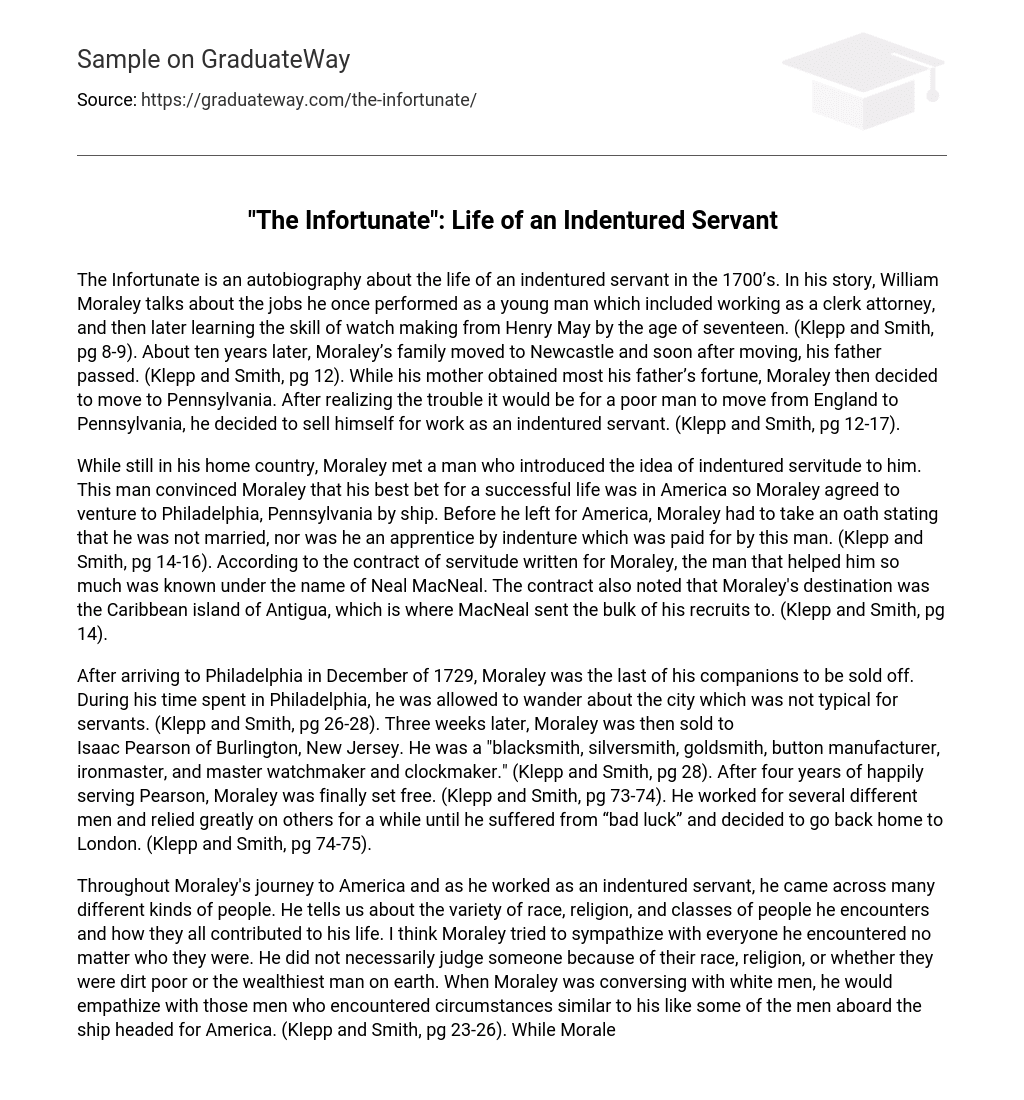The autobiography called The Infortunate recounts the life experiences of an indentured servant during the 1700s. William Moraley narrates his early occupations, such as working as a clerk attorney, and later acquiring watchmaking skills from Henry May by the age of seventeen (Klepp and Smith, pg 8-9). Approximately ten years later, Moraley’s family relocated to Newcastle, where his father passed away shortly after the move (Klepp and Smith, pg 12). Seeing that his mother inherited most of his father’s wealth, Moraley made the decision to journey to Pennsylvania. Recognizing the challenges faced by a financially challenged man moving from England to Pennsylvania, he opted to sell his services as an indentured servant (Klepp and Smith, pg 12-17).
While still in his home country, Moraley encountered an individual who introduced him to the concept of indentured servitude. This person convinced Moraley that his best opportunity for a prosperous life lay in America. Consequently, Moraley made the decision to embark on a journey to Philadelphia, Pennsylvania via ship. Prior to his departure for America, Moraley was required to make a sworn statement, stating that he was unmarried and not bound by an indenture agreement. This agreement was covered by the individual who had assisted him. (Klepp and Smith, pg 14-16). The servitude contract prepared for Moraley identified this helpful figure as Neal MacNeal. Additionally, the contract specified that Moraley’s destination was the Caribbean island of Antigua, which was where MacNeal primarily sent his recruits. (Klepp and Smith, pg 14).
Moraley arrived in Philadelphia in December 1729, and he was the last of his companions to be sold. While in Philadelphia, he had the unusual privilege of being allowed to explore the city, which was not typical for servants. After three weeks, Moraley was sold to Isaac Pearson of Burlington, New Jersey. Pearson was a versatile craftsman, engaged in various trades such as blacksmithing, silversmithing, goldsmithing, button manufacturing, iron manufacturing, and watchmaking. Moraley served Pearson happily for four years before finally gaining his freedom. Throughout his time in America, Moraley worked for different employers and relied heavily on others until he experienced a series of misfortunes, prompting him to return to London.
Throughout Moraley’s journey to America and his time as an indentured servant, he encountered various individuals, including people of different races, religions, and social classes. Moraley aimed to empathize with everyone he met, irrespective of their background. He did not pass judgment based on race, religion, or wealth. When conversing with white men in similar circumstances to his own, Moraley expressed understanding and sympathy. He also learned about the harsh conditions in which slaves lived and sympathized with them, unlike others who did not value their humanity. Moraley also had interactions with “civiliz’d, handsome-limb’d people,” referring to Native Americans, and respected their knowledge of the land and way of living, without criticizing their religious beliefs. However, Moraley did not extend this fair treatment towards women.
Moraley’s autobiography contains numerous instances of exaggeration. Some of these falsehoods or exaggerations were likely employed to entertain his readers. However, it is possible that certain falsehoods were unintentional, resulting from a significant time lapse between the occurrence of the event and its recording in Moraley’s autobiography. A specific example is Moraley’s claim that the ship arrived in Philadelphia’s port at the end of December in 1729, whereas records and city newspapers prove that it actually arrived in early December, between the ninth and sixteenth. (Klepp and Smith, pg 26). It could be argued that this minor error was either a deliberate lie to elicit more sympathy from his audience or simply a mistake due to the passage of time between the event and its documentation in Moraley’s autobiography.
Moraley faced multiple obstacles that hindered his success in life. Initially, he failed to capitalize on the opportunities available to him, neglecting to cultivate his talents (Klepp and Smith, pg 7). Furthermore, misfortune struck when he was denied inheritance of his father’s wealth due to his mother’s subsequent marriages (Klepp and Smith, pg 12-13). Additionally, after completing his servitude for Pearson, Moraley became overly reliant on others instead of establishing a stable profession, causing the generosity of others to wane (Klepp and Smith, pg 87-90). Thus, while Moraley possessed personal faults that contributed to his failure, external factors also played a role in guiding him towards an unsuccessful fate.
By reading William Moraley’s autobiography, I gained knowledge about indentured slaves in the 1700s, as well as insights into the lives of various individuals including slaves, Native Americans, and women during that era.





